 Petzlover
Petzlover Himalayan Sheepdog is originated from India but Otterhound is originated from United Kingdom. Both Himalayan Sheepdog and Otterhound are having almost same height. Himalayan Sheepdog may weigh 9 kg / 19 pounds lesser than Otterhound. Both Himalayan Sheepdog and Otterhound has almost same life span. Both Himalayan Sheepdog and Otterhound has same litter size. Himalayan Sheepdog requires High Maintenance. But Otterhound requires Moderate Maintenance
Himalayan Sheepdog is originated from India but Otterhound is originated from United Kingdom. Both Himalayan Sheepdog and Otterhound are having almost same height. Himalayan Sheepdog may weigh 9 kg / 19 pounds lesser than Otterhound. Both Himalayan Sheepdog and Otterhound has almost same life span. Both Himalayan Sheepdog and Otterhound has same litter size. Himalayan Sheepdog requires High Maintenance. But Otterhound requires Moderate Maintenance
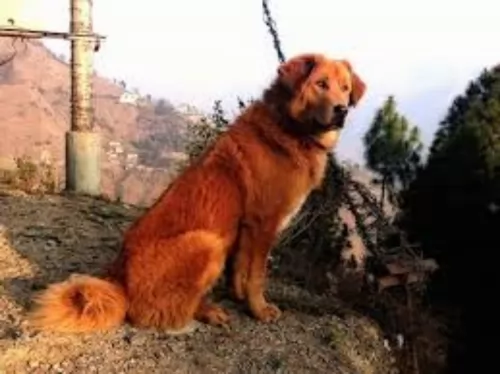 The Himalayan Sheepdog comes from Nepal originally and was bred as a guardian for livestock. The exact location where the breed comes from is not documented well but it is thought that they come from North India and Nepal and they are rare outside of that area. They are a mountain dog – close in ancestry to the Himalayan Mastiff, and the Kinnaur Sheepdog of Tibet (Himalaya). All these Himalayan mountain dogs were all called “Gaddi dogs”. The term was used for all the large dogs no matter what their breeds actually were.
The Himalayan Sheepdog comes from Nepal originally and was bred as a guardian for livestock. The exact location where the breed comes from is not documented well but it is thought that they come from North India and Nepal and they are rare outside of that area. They are a mountain dog – close in ancestry to the Himalayan Mastiff, and the Kinnaur Sheepdog of Tibet (Himalaya). All these Himalayan mountain dogs were all called “Gaddi dogs”. The term was used for all the large dogs no matter what their breeds actually were.
The Himalayan Sheepdog is called by various names depending on where they were from. They are called Gaddi Leopardhund in Himachai Pradesh, In Nepal they are known as Bhote Kukkur or Bhotiya. Then there are Chamba Gaddi dogs. They are an ancient breed that existed before documentation on breeds was kept.
They acted as both guardians and herders. They guarded the mountain men’s encampments as well as the livestock. They were also used at times to hunt large animals. Today they are found only within Nepal and India. These Himalayan Sheepdogs are on the verge of extinction in India. There are no breeding programs and their isolation has caused the dilution of the gene pool. It is not recognized by any clubs including the UKC and the AKC.
 There aren’t many Otterhounds around and this British pure-breed dog is a scenthound and dates far back to the 19th century.
There aren’t many Otterhounds around and this British pure-breed dog is a scenthound and dates far back to the 19th century.
The dog is regarded as a Vulnerable breed by the English Kennel Club. It is believed that these dogs descended from Bloodhounds and that it was developed in England to hunt otters.The dog’s nose is so sensitive that he was well suited to this job. He was appreciated by royalty and had many royal admirers.
The dog was brought to the United States in 1900 and the Otterhound Club of America was founded in 1960 with the Otter Hound being officially recognized by the American Kennel Club in 1991.
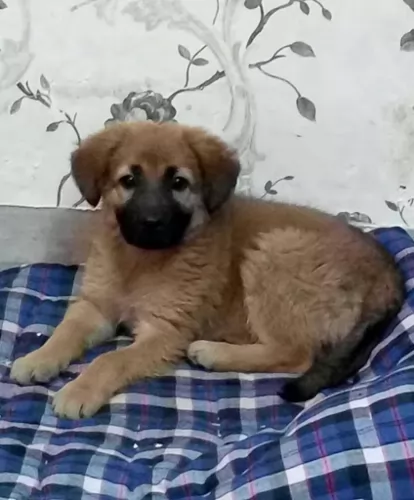 The breed is a large dog, very athletic and strong. The Himalayan Sheepdog is muscular with a deep chest, strong neck and strong shoulders. It has a medium tail that is thick and busy, curled high over its back. It is a daunting dog that can be very intimidating. They have well padded and large paws. With a broad head and wide forehead, they have a strong, wide muzzle. Their ears are high on the head and hang from the sides. They have almond shaped medium eyes that are deep set with a black nose.
The breed is a large dog, very athletic and strong. The Himalayan Sheepdog is muscular with a deep chest, strong neck and strong shoulders. It has a medium tail that is thick and busy, curled high over its back. It is a daunting dog that can be very intimidating. They have well padded and large paws. With a broad head and wide forehead, they have a strong, wide muzzle. Their ears are high on the head and hang from the sides. They have almond shaped medium eyes that are deep set with a black nose.
They are a very active and swift dogs. By their nature they are constantly in motion, patrolling their territory and guarding their flock and people. Their devotion to their people and their courage is the stuff of legends. Their coat is double with a large ruff around their necks that resembles a mane. The inner coat is dense and short while the outer coat is longer but dense as well.
 The Otterhound has a weather-resistant double coat which is somewhat oily. The coat is available in a number of colors such as wheat, red, grizzle, black, cream and tan with some white markings.
The Otterhound has a weather-resistant double coat which is somewhat oily. The coat is available in a number of colors such as wheat, red, grizzle, black, cream and tan with some white markings.
The double coat is somewhat oily and he has webbed feet, making him particularly suited for his life around water. This large hound stands at between 61 and 70cm and weighs in the region of 35 to 54kg. He has a large head with a nose that can track and scent in mud.
Otterhounds are active dogs, loving nothing more than to be running and playing, and that of course includes swimming. He makes a great sporting companion too and won’t have trouble keeping up with you as you jog or cycle.
These dogs are friendly, social, docile and amicable but they are also strong-willed, stubborn and independent. If you want him to be obedient and well behaved, then he will most certainly require training and socialization.
They get on well with children and will appreciate a firm, consistent, kind owner. He isn’t a city dog as he requires room to run, and therefore a farm or home with large grounds will suit him. Not only that, he is quite a barker, especially when he is bored with nothing to do so city life and living close to neighbors won't do for him . He will suit an active, outdoor family.
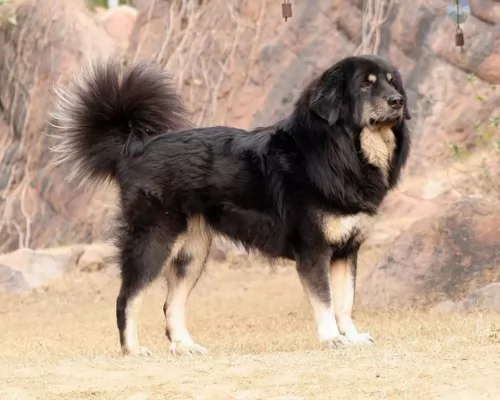 Yes with enough proper socialization
Yes with enough proper socialization
Protection and loyalty
They are not especially adaptable and need a large yard. They are not good in an apartment.
Intelligent but stubborn and independent making them able to learn if they want to.
 Your Otterhound is a big, beautiful dog who is also lovable, making a great pet for an active kind of family. He is friendly, social and playful but he is also independent and likes to have his own space occasionally.
Your Otterhound is a big, beautiful dog who is also lovable, making a great pet for an active kind of family. He is friendly, social and playful but he is also independent and likes to have his own space occasionally.
He is a loyal, fun dog who has a sense of humor, providing quite a bit of entertainment for his owner. He is the kind of dog that is willing to be 100% part of the family and will be thrilled to be counted in on all activities – whether camping, hiking or swimming.
Give him the love he craves and he will make you an awesome 4-legged friend.
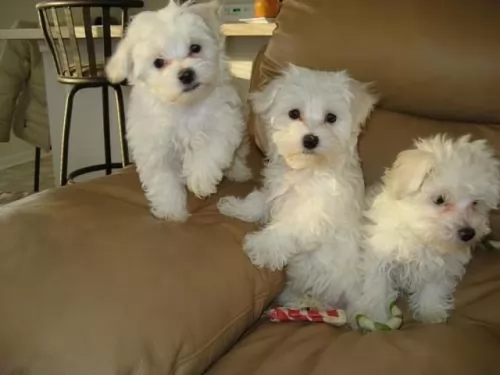 This is a pretty healthy breed with very few health issues. They have the usual large dog issues.
This is a pretty healthy breed with very few health issues. They have the usual large dog issues.
 The average lifespan of this dog is between 10 and 13 years, but with good care he can reach 15 years of age.
The average lifespan of this dog is between 10 and 13 years, but with good care he can reach 15 years of age.
The Otterhound is generally a healthy breed but he can sometimes get one or two of the common dog diseases there are.
Common problems that can occur are hip dysplasia. There are things that can be done to prevent this joint condition and one is to ensure your dog doesn’t become overweight. You also want to prevent having your young dog exercise excessively before his first birthday and you don’t want him leaping off beds or other high places.
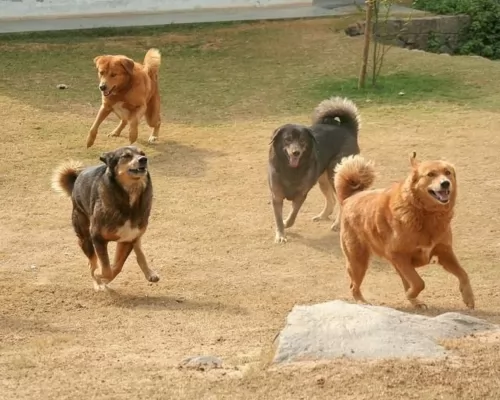 Feed the puppy 2-3 times a day with a total of two cups of a quality dog food for large breed dogs.
Feed the puppy 2-3 times a day with a total of two cups of a quality dog food for large breed dogs.
Feed the adult dog twice a day with 3 to 4 cups of a high quality dry dog food for large breed dogs.
They are very strong and athletic.
The Himalayan Sheepdog needs exercise but not to be overworked. They should be taken on long walks at least once a day. They might play fetch or run in a yard, but they don’t like too much exercise.
 Your Otterhound has a curly, longish water resistant double coat which doesn’t shed much. The coat is easy to groom, requiring nothing much more than a brush twice a week.
Your Otterhound has a curly, longish water resistant double coat which doesn’t shed much. The coat is easy to groom, requiring nothing much more than a brush twice a week.
The nails of the dog should be checked regularly and trimmed. Check in and outside his ears as well as his eyes for any sign of infection.
His teeth should also be checked. Some people are reluctant to brush their pet’s teeth, saying this is a new money-making fad and that it has never been required in the past. Whatever your views, periodically check inside your pet’s mouth for the sign of a rotten tooth as this can cause your pet a lot of pain and illness.
The Otterhound has no special food requirements and relies on you to feed him quality, tasty food. For convenience, there are some excellent ready-to-eat, convenient commercially manufactured foods made to cater for your pet’s size and his activity levels.
He also relies on variety in his diet, so give him some home-made food added into the kibble a couple of times a week. Boiled chicken, brown rice or pasta and some cooked vegetables such as carrots, sweet pototoes and spinach will be excellent for him.
He will thank you for keeping things so simple for him as then he won’t be plagued by digestive problems and visits to the vet. You can also add in some raw meat occasionally. Never leave him without fresh, cool water.